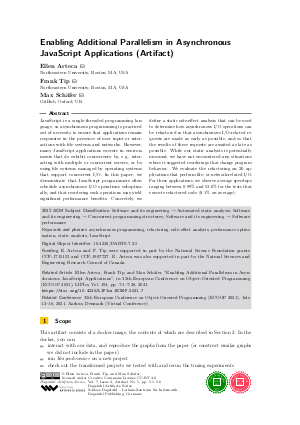Enabling Additional Parallelism in Asynchronous JavaScript Applications (Artifact)
Authors Ellen Arteca, Frank Tip, Max Schäfer
-
Part of:
Issue:
Special Issue of the 35th European Conference on Object-Oriented Programming (ECOOP 2021)
Part of: Volume: DARTS, Volume 7 (ECOOP 2021)
Part of: Conference: European Conference on Object-Oriented Programming (ECOOP)
Part of: Journal: Dagstuhl Artifacts Series (DARTS) - License:
 Creative Commons Attribution 4.0 International license
Creative Commons Attribution 4.0 International license
- Publication Date: 2021-07-06
Artifact Description

PDF
DARTS.7.2.5.pdf
- Filesize: 479 kB
- 6 pages
Document Identifiers
Subject Classification
ACM Subject Classification
- Software and its engineering → Automated static analysis
- Software and its engineering → Concurrent programming structures
- Software and its engineering → Software performance
Keywords
- asynchronous programming
- refactoring
- side-effect analysis
- performance optimization
- static analysis
- JavaScript
Metrics
- Access Statistics
-
Total Accesses (updated on a weekly basis)
0Document
0Metadata
Artifact
DARTS-7-2-5-artifact-2004edb5b603c4c97d7bffae052939fa.tgz
(Filesize: 2.28 GB)
MD5 Sum:
2004edb5b603c4c97d7bffae052939fa
(Get MD5 Sum)
Abstract
JavaScript is a single-threaded programming language, so asynchronous programming is practiced out of necessity to ensure that applications remain responsive in the presence of user input or interactions with file systems and networks. However, many JavaScript applications execute in environments that do exhibit concurrency by, e.g., interacting with multiple or concurrent servers, or by using file systems managed by operating systems that support concurrent I/O. In this paper, we demonstrate that JavaScript programmers often schedule asynchronous I/O operations suboptimally, and that reordering such operations may yield significant performance benefits. Concretely, we define a static side-effect analysis that can be used to determine how asynchronous I/O operations can be refactored so that asynchronous I/O-related requests are made as early as possible, and so that the results of these requests are awaited as late as possible. While our static analysis is potentially unsound, we have not encountered any situations where it suggested reorderings that change program behavior. We evaluate the refactoring on 20 applications that perform file- or network-related I/O. For these applications, we observe average speedups ranging between 0.99% and 53.6% for the tests that execute refactored code (8.1% on average).
Cite As Get BibTex
Ellen Arteca, Frank Tip, and Max Schäfer. Enabling Additional Parallelism in Asynchronous JavaScript Applications (Artifact). In Special Issue of the 35th European Conference on Object-Oriented Programming (ECOOP 2021). Dagstuhl Artifacts Series (DARTS), Volume 7, Issue 2, pp. 5:1-5:6, Schloss Dagstuhl – Leibniz-Zentrum für Informatik (2021)
https://doi.org/10.4230/DARTS.7.2.5
BibTex
@Article{arteca_et_al:DARTS.7.2.5,
author = {Arteca, Ellen and Tip, Frank and Sch\"{a}fer, Max},
title = {{Enabling Additional Parallelism in Asynchronous JavaScript Applications (Artifact)}},
pages = {5:1--5:6},
journal = {Dagstuhl Artifacts Series},
ISSN = {2509-8195},
year = {2021},
volume = {7},
number = {2},
editor = {Arteca, Ellen and Tip, Frank and Sch\"{a}fer, Max},
publisher = {Schloss Dagstuhl -- Leibniz-Zentrum f{\"u}r Informatik},
address = {Dagstuhl, Germany},
URL = {https://drops.dagstuhl.de/entities/document/10.4230/DARTS.7.2.5},
URN = {urn:nbn:de:0030-drops-140290},
doi = {10.4230/DARTS.7.2.5},
annote = {Keywords: asynchronous programming, refactoring, side-effect analysis, performance optimization, static analysis, JavaScript}
}
Author Details
Funding
E. Arteca and F. Tip were supported in part by the National Science Foundation grants CCF-1715153 and CCF-1907727. E. Arteca was also supported in part by the Natural Sciences and Engineering Research Council of Canada.
Related Article
- Ellen Arteca, Frank Tip, and Max Schäfer, "Enabling Additional Parallelism in Asynchronous JavaScript Applications", in 35th European Conference on Object-Oriented Programming (ECOOP 2021), LIPIcs, Vol. 194, pp. 7:1-7:28, 2021. https://doi.org/10.4230/LIPIcs.ECOOP.2021.7
